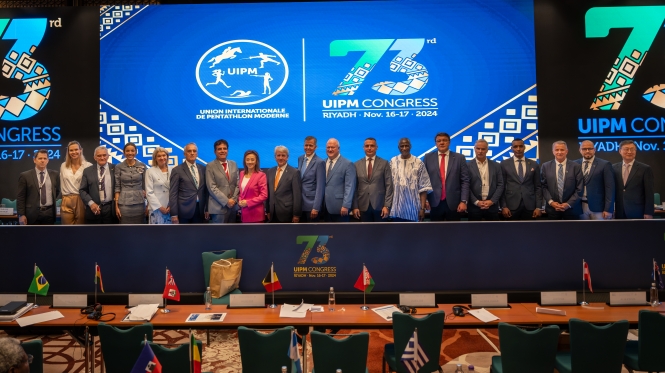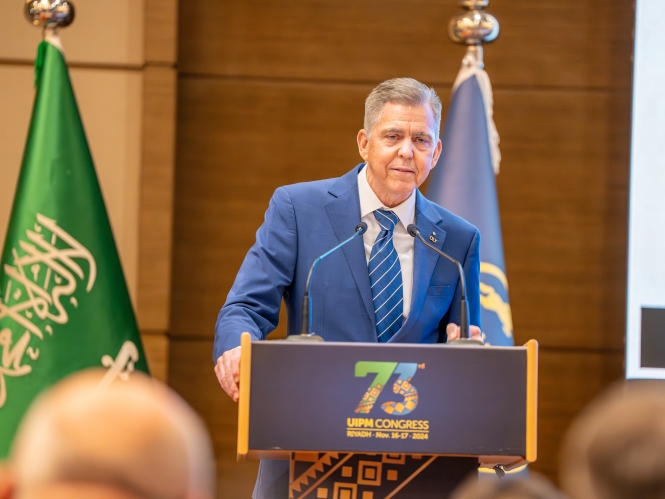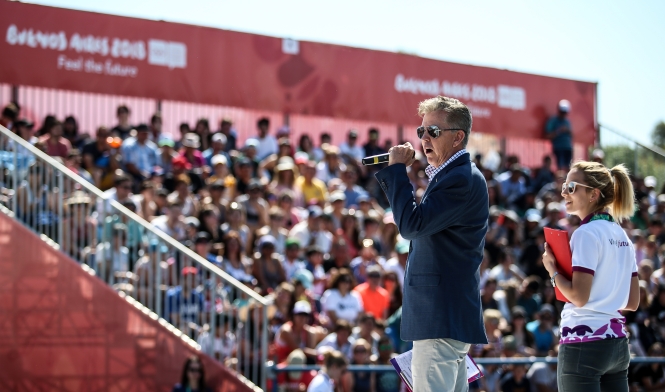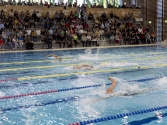Pentathlon Personalities: New UIPM President Rob Stull OLY on his priorities, pride and the power of the Olympic Games

In a dramatic vote on 16 November, 2024, Rob Stull was elected as the 7th UIPM President, kicking off a four-year term which will run all the way to the 2028 Olympic Games in his home country, United States.
As he begins on the whirlwind road to Los Angeles, President Stull found a rare quiet moment during the UIPM 2024 U15 Tetrathlon World Championships in Guatemala City (GUA) to catch up with UIPM News.
In a wide-ranging discussion on his priorities, hopes and concerns for Pentathlon, the 62-year-old President also looked back on his own remarkable journey from being a Maryland farm boy to becoming a two-sport Olympian, and how the Games changed his life…
Now that it’s all sunk in a little, how do you reflect on becoming UIPM President?
I can tell you that it’s the capstone of my career. I started this journey 44, I guess 45, years ago now, as a young pentathlete, like all of these young athletes here at the U15 World Championships. I wasn’t actually U15. I started at 18 but it’s been a long road and I’ve done just about everything you can do and I’ve had a lot of fun. Pentathlon has given me opportunities I never would have had outside of it and I want to give back. What does it mean to me? It’s interesting because the outgoing President did such a fine job and fought for Pentathlon. It wouldn’t be what it is without Dr Schormann, that’s for sure. He deserves all of the kudos and credit for the job that he did. We have now turned a page, there are big changes for the sport in terms of the new discipline. But as I said in my remarks to Congress, I work for the national federations. They don’t work for me. They’re my employers if you like. This is a volunteer job, I know, but they’re my bosses. So what I’m trying to do is lead the sport and support our Secretary General Shiny Fang and her wonderful team, which I have so much respect for, and provide the support they need as we move towards Los Angeles and 2028. Paris was a dramatic success. I’m sure for all sports but certainly for Pentathlon. The French really came through at a time when I think the world needed a successful Olympic Games. I think it was so important to the planet. The bar has been raised and we must rise now to meet that bar, that new standard. We’re going to try to build on that towards a third summer Games in the United States.

Being elected with the next Olympic Games approaching on US soil must feel special?
I think that was maybe one of the biggest reasons that put me over the top. It was a very close election, three highly qualified candidates. Joel and Sharif are both very qualified and I don’t think the electorate could have gone wrong selecting anyone. But the reason I think I may have got across the goal line is the LA Games being in the States and me being an American has something to do with it. I hope to meet those expectations. I know they’re very high but I will be doing my very best to see that we have an iconic venue and build on the success of Paris.
What excites you most and what do you see as your priorities?
First off, I’m a former pentathlete myself, I managed to participate in a number of Games in both Pentathlon and Fencing. So I come from the athletes’ side of things. But all sports, not just Pentathlon, were faced with a dilemma: in order to attract the youth of today, we had to innovate and need to be relevant to them. When we were faced with that, some hard decisions had to be made. A decision was made to not proceed with the equestrian discipline, it was hurting our accessibility significantly among many reasons, fairness amongst them. There were then 62 sports that applied and we looked hard at but when the needle landed on Obstacle racing, that has given us an incredible chance in terms of accessibility. The opportunity to grow the sport is huge. I had already had a foot in that community. So priorities: number one is to see that there is Obstacle accessibility in every one of our national federations across the world during my term. We are already more than halfway there, much more than halfway, perhaps two-thirds of the way. So I have no doubt we will meet that goal. Also we’re going to have 72 athletes at the LA Games and those 72 athletes, those are the Olympians, but there are far, far more, many thousands of athletes who have the ability to take the journey, the Olympic journey. I wake up every morning feeling grateful that I had the opportunity to experience the Olympic dream. So a priority in that sense is being able to fund those dreams by being able to provide additional support to national federations, creating a commercial model that is sustainable. Right now many federations are at the mercy of their governments and their sports ministries when it comes to funding. That’s certainly valuable and appreciated. However, we need to be able to feed ourselves. Developing a commercial model that will allow for revenue streams that can be either passed down to the national federations or indeed created by them themselves is a key priority.

On the flipside, what concerns you the most?
Not having enough seats in the stadium in LA! That’s my biggest concern. I know how popular this is going to be. I say it only half-jokingly. I have had meetings with most Olympic Games organisers since Atlanta 1996, and I tell people, you know, Pentathlon is one of the first sports that is sold out at every Games. People who want to go to the Games and see as many things as possible, that’s very common. Here’s a sport that has five very different disciplines and skillsets for just one ticket. That’s why I try to tell the Games organisers that we’re not going to have any trouble filling stadiums.
Your own sporting journey may not be as well known. Where does it all begin for you?
I grew up on a working farm on the east coast of the United States. It’s a family farm, my father was a gentleman farmer, we still have it in the family and I consider that my home base. That gave me a really strong family orientation. I wasn’t the best athlete of the family by any means. I have two brothers, one of whom is very much involved in Pentathlon too. He’s now Chair of the UIPM Medical Committee, he’s an orthopaedic surgeon and was a very talented athlete. But our older brother was the best athlete and wasn’t interested in competitive sports at all. I got into sports but didn’t know what Pentathlon was. I ran track and swam as a schoolboy, played American football and baseball. I was a good all-round athlete but not a great one. I was middle of the pack but started at university and my team-mate was Duncan Goodhew, who went on to be an Olympic champion in the 100m breaststroke in Moscow, a British guy. He had been at the Montreal Games and the British had done very well in Pentathlon in 1976. Duncan knew about Pentathlon and so he told me ‘here’s a sport that combines running and swimming and you’d probably be pretty good at it’. Here I am 45 years later. That was Duncan. I’m still in touch with him, we communicate from time to time. That was the beginning of the road. Pentathlon has a military background of course, everyone knows that and those days the American team was training in Fort Sam Houston in Texas. I made a phone call and talked to Colonel Jim Moore, who was an Olympic silver medalist and he said ‘hey, you ought to come out to San Antonio and give it a shot’. I did — and here I am.
Was it a quick transition from there?
I fell in love with the sport, fell in love with the diversity of it. I ended up making the Olympic team in Fencing as well, because you had to fence, but I really didn’t know what Fencing was. I knew what sword-fighting was. I was a Maryland farm boy. I used to watch the old Errol Flynn black-and-white movies, the Pirates of the Caribbean of its day. I watched them sword fight and thought it was really cool. Now I finally had the opportunity to do it and I took to it. I firmly believe that everybody is good at something. It might take night-vision goggles and a pickaxe for you to find it but everyone is good at something, you just gotta find it. The other thing I would say is that I fell in love with the Olympic movement as a very young kid. In 1968, watching the opening ceremonies of the Mexico City Games. The pomp and circumstance, the grandeur, I had never seen anything like that and I wanted to be involved. I wanted to do it. I’ve done 16 Games in one capacity or another over the years and I still love all of that and believe in it.

The first of those 16 was the LA Games in 1984?
It’s a little bit of a sore point for me actually because the team at that time was four guys and the alternate was actually the fifth guy. We used to call the fourth guy the reserve. I was third in selection, third in trials and just before the Games, in LA, they were choosing the starters. I was the youngest guy in the team and had made it as a bit of a dark horse so I was pushed into the reserve position. I was disappointed of course but the team went on to win a silver medal and they had voted for me as a team captain, probably as a consolation prize but I got to go on and do everything with the team. I still count that, I’m in the books as part of that Olympic team. But that got me hungry. I wanted to prove myself so the next year, I was 9th or 10th in my first Senior World Championships in Australia in 1985. Back in those days, in my days in Pentathlon, if we were to guess who will get sixth, at World Championships or World Cups or whatever, who’s going to get sixth? It was me. I was that guy. I was Mr 6th. I probably won 6th place more than any other athlete. That’s why I consider myself a good athlete but not a great. But I know the greats, I competed with the greats.
But you hold a very special place in Olympic history. You went to the 1988 Olympic Games and competed in two sports, Fencing and Pentathlon?
Oh yeah and I wouldn’t do that again! That was 11 days of serious competition over the 16-day program. It was brutal. It was a great experience. On the Fencing side, I was one touch in overtime from advancing into the final rounds. I loved Fencing. I still do. I still fence with the guys. I like to go out there with the current team and mix it up, to see if the old dog can still hunt.

Can he?
He can, on occasion! I don’t know if they figure ‘hey, maybe I shouldn’t beat this guy because he’s writing the cheques and I don’t want to offend him’. Maybe they’re being kind to me. But that’s okay. I enjoy it, I still enjoy that athlete experience.
Do you get much time for a life outside of sport today?
I’m based in Colorado Springs and I’m single, and so I’m able to spend a lot of time with sports. My kids, my family, they are the athletes. If you’re an athlete, I don’t care if you’re 35 years old, I’m like ‘yeah, you’re one of my kids’. Sports keeps you young, being surrounded by these young and energetic people keeps you young.

You have served another role at UIPM events for years — the announcer. What does that role mean to you and will you miss it?
You’re a familiar face and people get to know you and talk to you. I always enjoyed that. I never looked at it as work. People would say to me ‘great job, thanks for doing that’ and I’d say ‘oh, I enjoy it’. Their response would be ‘yeah, it’s obvious you enjoy it!’ I feel like I’m part of the game, part of the show. Sports is entertainment you know, it’s all part of the show. I would try to add to that, that sense of show. I’d like to think I had something to do with helping build the sports presentation programme we have today. I think I’d like to do…I’ll have to see if they let me…be a cameo guy on the mic occasionally, just to keep my hand in the game. Like right now, here in Guatemala I’m out on the field, I don’t have a mic but I’m out there, talking to the athletes. If you don’t like this, you’re in the wrong job. Now, I definitely have to put on a coat and tie a little more often and be a leader moving forward but I do like to get out there with the athletes. The joy and the triumph you see, you see the folks who maybe didn’t have the performance they hoped for. But that’s life, the peaks and valleys. How boring would life be without the thrill of victory and the agony of defeat? That’s a lot of fun. I’ve never met one person in my entire life who didn’t come out and see a Pentathlon event and not walk away thinking that is cool. Not a single person.

What would you say to some senior stars of Pentathlon beginning pre-season after Paris but still carrying doubts about adapting to Obstacle?
It’s real simple. We’ve had changes, like all sports have. In my career we’ve gone from shooting .22 calibre pistols at turning targets, then biathlon targets before we got to Laser targets and the run-shoot part of it. There are so many adaptations over the years, going from 4000m to 3000m now 5x600m is a whole other kind of race. So things change. Some people adapt and some people don’t. I’m aware of maybe two athletes retiring. There may be more. But there are just two who I am aware of from the 72 athletes who competed at Paris. But most of them want to go on, they’re game. And some of them will transition and do it very well because we already know that these people are brilliant athletes. There are some for whom size, strength, strength-to-weight ratios, might be a challenge for them at first. That doesn’t mean they’re not going to be very good. They may drop from the top five to the top 10. They may decide that they gave it their best and move on to something else but I will be encouraging all of them to try. Ultimately that is also a normal transition in sport. You pick the sport and there’s a good chance that I can tell you where the transition points are. We have developed the sport now where we have so many talented athletes. There are other sports where one or two countries dominate a sport but in Pentathlon it’s rare that a single country dominates. It’s very much on the day.
Will you get a break or some down time over the holidays?
The family farm back in Maryland — that’s where I will be for Christmas. Recharging and getting ready for hitting the ground running in 2025. I’m really looking forward to it. We have such a great team with the National Federations and the UIPM staff. We’re trying to fill some very big shoes after Dr Klaus Schormann, our most recent President and now Honorary President. But you can feel how exciting this is, with a Games in the United States coming. I’ll end on this but I always remember in 1984, I had never been part of a Games yet and I didn’t know what I didn’t know. But here we are for the Opening Ceremony at the LA Coliseum and the home team is always the last team to enter. We were all in the tunnel and you can see that iconic image of the Coliseum and you can hear the announcer shouting ‘Zaire, Zimbabwe' because it’s alphabetical. We knew we were next and it was ‘ladies and gentlemen, the United…’ and you couldn’t hear anything else. It was deafening. The stadium just erupted. That’s where I really understood the power of sport and the power of the Olympic Games. I want our 72 athletes in 2028 to experience all of that, to feel it. But I also want to ensure that that power is felt across our sport at every level. It’s a life-changing feeling.
Interview by Joe Callaghan





